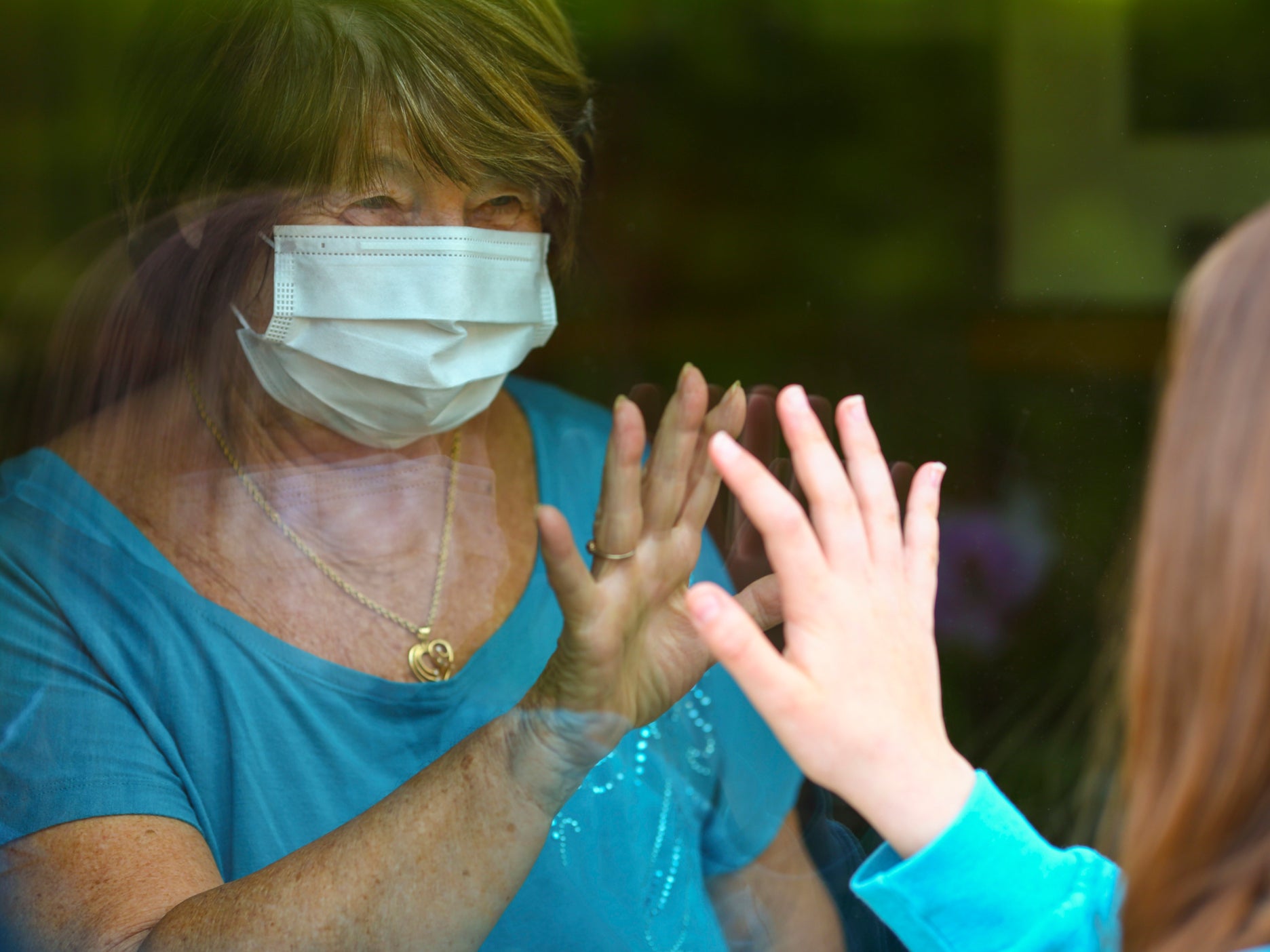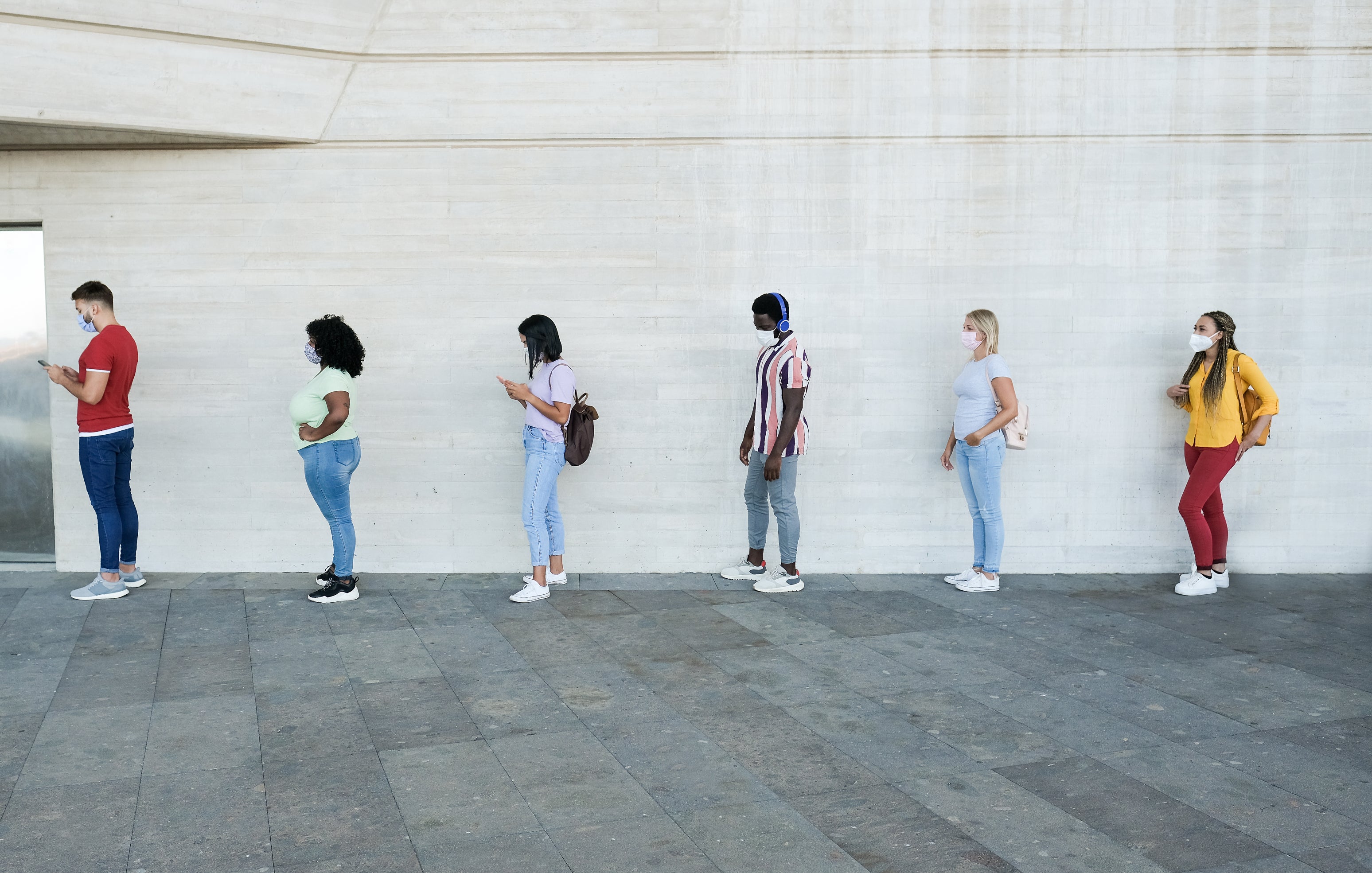‘It’s not just a normal winter of flu, it’s been nearly 18 months’: How the pandemic changed our perception of disease
After a year of restrictions and more than 150,000 deaths, Saman Javed explores how Covid-19 has changed our understanding of illness


Most of us will remember the feeling of overwhelming dread as Boris Johnson announced the first UK lockdown on 23 March 2020. Public angst was high; supermarkets were already struggling to keep shelves stocked as people rushed to stockpile essentials, the Foreign Office had urged Britons abroad to return home, and 335 people had already died from the virus.
In part, the worry came not only from the threat of a disease that scientists were still struggling to understand but a lack of consensus on the best approach to handle the crisis around the world. While some countries quickly closed their borders, others ramped up their testing. In the UK, the government clung to a flu-pandemic model, announcing that only those who were admitted to the hospital would be tested for the virus at the beginning of March, shortly before committing to testing 25,000 people a day.
Now, almost 18 months later, 77 per cent of the UK population has received both doses of a Covid-19 vaccine and an average of more than 700,000 tests are carried out daily. As the government has got to grips with the pandemic, the public has had to adapt to ever-changing guidelines on how they should protect themselves. While all social restrictions were lifted last month, it’s undeniable that a year of three national lockdowns, mandates on the wearing of face coverings and education on the importance of social distancing and handwashing has had a lasting impact on how we think about disease.
“We are never a disease-free society so when we talk about when something becomes endemic, there’s not a number that gives us an answer to that, it’s when does it become acceptable, so we no longer see it as a problem.“
For Beth Vincent, 30, from York, a year of living under restrictions has changed the way she thinks about common illnesses. In part, this is because two of the main symptoms associated with coronavirus – a high temperature and cough – are also seen in the common cold and flu. “It was almost like you weren’t aware of the threat before the pandemic. Everyone would talk about having a cold and it and it was seen as the status quo. Before if I had a cold I’d still go into work and continue as normal, now I’ll think ‘I don’t want to make other people sick’ and think twice,” she says.
A year of social restrictions aimed at curbing the spread of coronavirus has also given David Trott, 40, from London, a greater understanding of how disease spreads and affects the whole of society, not just an individual. At the height of the pandemic, government officials and scientists drilled home the significance of Covid-19’s “R” number – the number of people that one infected person will pass on a virus to. Without any measures to stop its curb, Covid-19 has an average R number of three. “I’m certainly more aware now of how important community is in disease prevention. Even as the threat of Covid-19 reduces, I’m definitely going to continue with some protective behaviours learned during the pandemic. I’m likely to keep wearing masks when I can, and maintaining social distance where possible,” Trott says.
Unlike other illnesses that might spread globally (like the flu) we did not have an immediate answer for how to fix Covid overnight. By the time the first vaccine was approved in December 2020, more than 60,000 people had already died in the UK alone. A year without a vaccine or treatment for a mutating virus meant that people had no choice but to think about other ways to curb its spread, by changing their behaviours.
“This has not been just a normal winter of flu, it’s been nearly 18 months,” Sir Cary Cooper, a professor of organisational psychology at the University of Manchester says. “We are waking up to the fact that even when this virus goes there will be other viruses or flus, so I think there will be a proportion of people who will continue to take steps to protect both themselves and others,” Cooper adds.

For the first time since the SARS outbreak in 2002, the public learned and adapted their behaviours in real-time as scientists struggled to understand the origins and spread of a previously unknown disease. “In the beginning, everyone thought that it was just spread by coughing and that the droplets would go into the air and then drop down onto surfaces,” Sarah Pitt, a microbiologist and chief examiner for virology at the Institute of Biomedical Science says, explaining why the cleaning of surfaces and handwashing was initially given greater impetus than mask-wearing. As time went on, scientists realised that while large droplets containing the virus do fall, lighter ones can linger in still air in enclosed spaces. “For respiratory viruses, we always thought of the immediate effect of being right beside somebody. But [Covid-19] hangs around in enclosed spaces, so you don’t necessarily have to have direct contact with the person who spread it,” she says.
The latest statistics suggest that Vincent and Trott aren’t alone in their plans to continue with some of their Covid-learned behaviours long-term. Ahead of the lifting of social distancing restrictions in the UK, 64 per cent of UK adults surveyed by the Office of National Statistics said they planned on continuing to wear face masks on public transport and in shops after 19 July.
But this could be shortlived; looking back at the history of pandemics points to a faster return to “normality” than we might anticipate once the perceived threat is seen to have passed. Erica Charters, a professor of the history of medicine at the University of Oxford, says her research has shown that our social and cultural memory of disease is relatively short-lived. For example, she points to the first cases of HIV.
“If we go back and read the early writings around HIV, people wrote in a very similar way to what we see with Covid-19. They were shocked, they couldn’t believe it was happening, and they wrote about how we hadn’t been through anything like it before. As a historian, I think it’s very interesting when you see people writing about never having been in a situation before repeatedly throughout history.”
During the 1918 Spanish flu, it was common for people to wear protective masks, but this practice was largely abandoned by the public once the Spanish flu had ended.
Part of the reason for this, Charters explains, is society’s propensity to see disease as something other, that acts on society rather than as a part of society. Therefore, when new diseases emerge, there’s an element of shock that causes a change in behaviour, but once the disease becomes an accepted part of our lives, as HIV has, those behaviours also cease. “We are never a disease-free society so when we talk about when something becomes endemic, there’s not a number that gives us an answer to that, it’s when does it become acceptable, so we no longer see it as a problem,” she says.
Steven Taylor, a clinical psychologist and author of The Psychology of Pandemics: Preparing for the Next Global Outbreak of Infectious Disease believes it's unlikely that the public in the UK and the US will continue to practice protective behaviours in the long-term because “not a long has changed over the past 100 years”. “During the 1918 Spanish flu, it was common for people to wear protective masks, but this practice was largely abandoned by the public once the Spanish flu had ended. The same is likely true for Covid-19; at a societal level, most of the effects of the pandemic will probably be short-lived,” Taylor says.
This analysis appears to align with the views of those who feel more relaxed about the threat of coronavirus. Tufayel Ahmed*, 24, from London, says that while he feels better educated on the spread of infectious diseases now, the pandemic has not changed how he views other illnesses. “I’m no more scared of a virus now than I was a year ago. Everyday illnesses like colds haven’t killed many people and they don’t really cause much harm to society. As for Covid-19, I’m double vaccinated, and I’ve had the virus, so I don’t think I’m a huge spreader of the disease.”
Despite Trott, Vincent and Ahmed offering differing views on whether the past year changed the way they view disease, each of them has expressed an increase in concern for the people around them that they hadn’t considered pre-pandemic. Although Ahmed is no more fearful about contracting an illness than he was a pre-pandemic, he worries more for his parents and grandparents.
Covid-19 has brought Trott a greater understanding of how his actions affect others, and Vincent says she is always aware that she may be interacting with people who are immunosuppressed when out in public. While it may be too soon to see which elements of our pandemic existence will continue for years to come, it's clear that the pandemic has impacted each of us in one way or another.
This name has been changed to protect their privacy.
Join our commenting forum
Join thought-provoking conversations, follow other Independent readers and see their replies
Comments
Bookmark popover
Removed from bookmarks